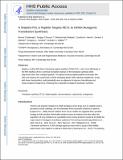A stapled POL κ peptide targets REV1 to inhibit mutagenic translesion synthesis
Author(s)
Chatterjee, Nimrat; D'Souza, Sanjay; Shabab, Mohammad; Harris, Cynthia A; Hilinski, Gerard J; Verdine, Gregory L; Walker, Graham C; ... Show more Show less
DownloadAccepted version (619.5Kb)
Open Access Policy
Open Access Policy
Creative Commons Attribution-Noncommercial-Share Alike
Terms of use
Metadata
Show full item recordAbstract
© 2020 Wiley Periodicals LLC Stapled α-helical RIR (Rev1-interacting region) peptides of DNA POL κ bind more effectively to the RIR-interface of the C-terminal recruitment domain of the translesion synthesis DNA polymerase Rev1 than unstapled peptide. The tightest-binding stapled peptide translocates into cells and enhances the cytotoxicity of DNA damaging agents while reducing mutagenesis. Drugs with these characteristics could potentially serve as adjuvants to improve chemotherapy and reduce acquired resistance by inhibiting Rev1-dependent mutagenic translesion synthesis.
Date issued
2020-07Journal
Environmental and Molecular Mutagenesis
Publisher
Wiley
Citation
Chatterjee, Nimrat, D'Souza, Sanjay, Shabab, Mohammad, Harris, Cynthia A, Hilinski, Gerard J et al. 2020. "A stapled POL κ peptide targets REV1 to inhibit mutagenic translesion synthesis." Environmental and Molecular Mutagenesis, 61 (8).
Version: Author's final manuscript
ISSN
1098-2280
